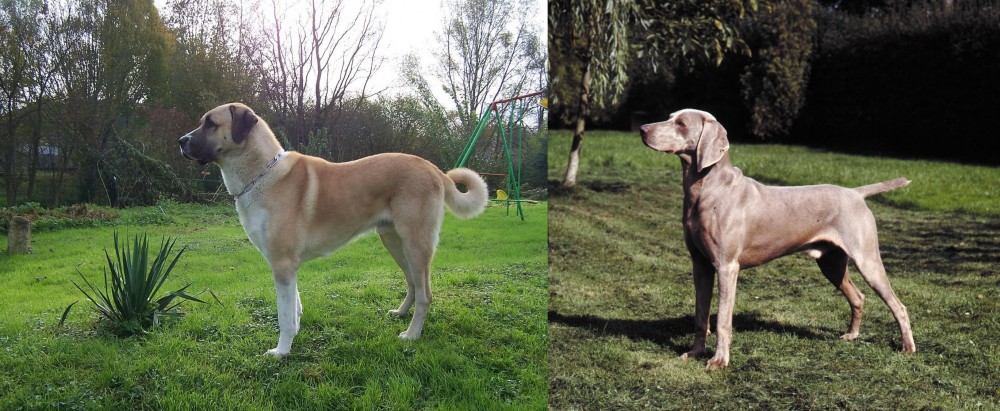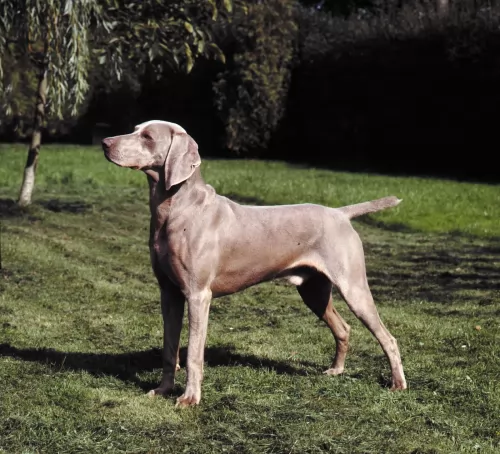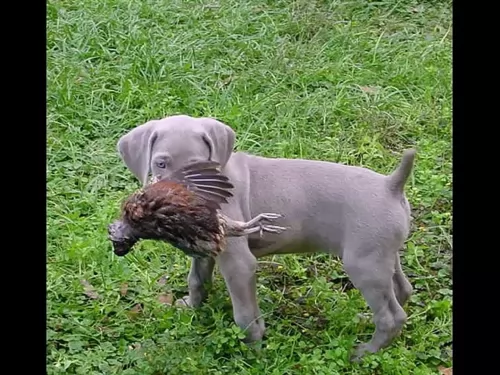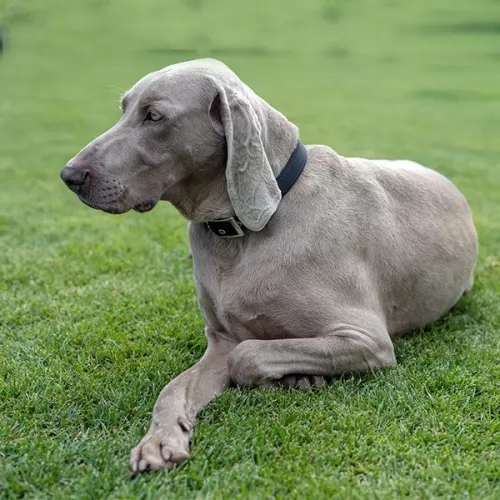 Petzlover
Petzlover Anatolian Shepherd is originated from Turkey but Smooth Haired Weimaraner is originated from Germany. Anatolian Shepherd may grow 6 cm / 3 inches higher than Smooth Haired Weimaraner. Anatolian Shepherd may weigh 28 kg / 62 pounds more than Smooth Haired Weimaraner. Anatolian Shepherd may live 3 years less than Smooth Haired Weimaraner. Both Anatolian Shepherd and Smooth Haired Weimaraner has almost same litter size. Anatolian Shepherd requires Moderate Maintenance. But Smooth Haired Weimaraner requires Low Maintenance
Anatolian Shepherd is originated from Turkey but Smooth Haired Weimaraner is originated from Germany. Anatolian Shepherd may grow 6 cm / 3 inches higher than Smooth Haired Weimaraner. Anatolian Shepherd may weigh 28 kg / 62 pounds more than Smooth Haired Weimaraner. Anatolian Shepherd may live 3 years less than Smooth Haired Weimaraner. Both Anatolian Shepherd and Smooth Haired Weimaraner has almost same litter size. Anatolian Shepherd requires Moderate Maintenance. But Smooth Haired Weimaraner requires Low Maintenance
 Up in the mountains of central Turkey, in the region called Anatolia, a large, strong and rugged dog breed was born and is honored today on a postal stamp. This was the Anatolian Shepard – keeper of the flocks with strength, agility and speed. The Anatolian Shepard is able to pursue and catch any predator that threatens his livestock and they are his livestock. His keen sense of hearing and his excellent sight only add to his prowess as a protector.
Up in the mountains of central Turkey, in the region called Anatolia, a large, strong and rugged dog breed was born and is honored today on a postal stamp. This was the Anatolian Shepard – keeper of the flocks with strength, agility and speed. The Anatolian Shepard is able to pursue and catch any predator that threatens his livestock and they are his livestock. His keen sense of hearing and his excellent sight only add to his prowess as a protector.
The Anatolian is a giant dog, classified as a shepherd by the UKC – Kennel Club of the United Kingdom, while he is classified as a mountain dog or molossus by the Federation Cynologique International. When the breed was created, they were a gift to the farmers in the mountains to guard the livestock from cheetahs. This helped the cheetahs to stop attacking the livestock and prevented the farmers from wiping out the cheetah population by shooting them.
The Anatolian Shepard does have some controversy in his lineage as in some areas he is considered to be either the most closely related or the same breed as the Turkish Kangal Dog. The Anatolian is considered to have a blood line that goes back at least 6000 years.
They are direct descendants of mastiffs and mountain dogs. Yet they have the long legs, agility and aloofness of the sight hounds that are also in their bloodline. Originally called the “Coban Kopegi” or shepherd dog by their Turkish farmers, they were eventually separated into the breed called the Anatolian Shepard. When the breed was first brought into the United Kingdom the line of the Kangal dog was first. Then they were crossed with dogs called Anatolian Shepherds. Many breeders believe that the Anatolian Shepherd is a category that includes the Kangal, Coban Kopegi, Aksaray Malaklisi and the Akbash dog.
So as of January 2012, the Australian National Kennel Club no longer considers the Anatolian Shepard and the Kangal as separate breeds. The UK Kennel Club now recognizes the Kangal and the Anatolian as the same breed. For others they are still clearly separate and distinct breeds with the ASD being their own breed. In fact, the government of Turkey recognizes them as separate breeds and the Kangal Dog as the National Dog of Turkey.
The Anatolian Shepard was already in the United States in when the Anatolian Shepard Club of America came into being because of a young naval officer who had met the dogs in Turkey. They were allowed into the Miscellaneous Class of the American Kennel Club in 1996 after this naval officer had been breeding them in California for years. By 1998 they had moved to the Working Group where they reside today.
 The Smooth Haired Weimaraner is a beautiful silvery-grey dog that was once bred for hunting way back in the 19th century.
The Smooth Haired Weimaraner is a beautiful silvery-grey dog that was once bred for hunting way back in the 19th century.
He has always been described as an all-purpose gun dog bred from crossing different German and French hunting dogs with the Bloodhound.
History of this dog dates back to 1897. This is when a club was formed in Germany for the breed.
 Coming from the mountains and guarding their flock against cheetahs has led the Anatolian Shepherd to be a muscular dog with broad heads and thick necks and sturdy, strong bodies. Their ears drop and are triangular in shape, while their muzzles are rectangular with tight lips. Their double coat is thick and warm fitting for life in the mountain regions. They do blow their coats with excessive shedding twice a year. The fur on their throat is extra thick for their protection.
Coming from the mountains and guarding their flock against cheetahs has led the Anatolian Shepherd to be a muscular dog with broad heads and thick necks and sturdy, strong bodies. Their ears drop and are triangular in shape, while their muzzles are rectangular with tight lips. Their double coat is thick and warm fitting for life in the mountain regions. They do blow their coats with excessive shedding twice a year. The fur on their throat is extra thick for their protection.
Muscular, thin, their rib cage is large while their stomach is small. Their tails can be intact or docked. The Anatolian Shepherd is much like the Kuvasz or the Great Pyrenees in their size, shape and responsibilities. He is more agile and slenderer than those two dogs. Their bite is scissors or level, while their eyes are almonds, set apart in their heads.
 The lean, well muscled Smooth Haired Weimaraner is athletic to look at, brimming with energy and vitality. The coat is smooth and short and is a magnificent steel grey to silver coat which even tends to be a blue-grey color.
The lean, well muscled Smooth Haired Weimaraner is athletic to look at, brimming with energy and vitality. The coat is smooth and short and is a magnificent steel grey to silver coat which even tends to be a blue-grey color.
The short coat makes the dog low maintenance. He is also a low shedding dog. He is a medium to large sized dog standing at between 57 and 70cm in height and weighing in the region of 25 to 40kg.
The tail has always been docked, giving him that distinctive, dignified appearance. The tail then measures about 6 inches in length.
These dogs are also excellent water dogs with their webbed paws. The ears of the dog are medium length and floppy and the eyes are light amber or a blue-grey color.
You just have to look at the Smooth Haired Weimaraner and you can see how he just loves being with his human owner all the time, so much so that he is known for separation anxiety. Sometimes he can become so distraught separated from his owner that he can even injure himself trying to reach his owner. Being separated for too long can cause him anxiety issues.
Certainly this dog is going to need the right kind of training and socialization to calm him. They’re also full of energy too and are going to require a good amount of exercise.
 This breed is independent, stubborn and strong. They are great protectors of their flocks and people, but they are incredibly challenging to own. They are intelligent, loyal dogs who learn quickly when they want to. They key being “when they want to”. The Anatolian Shepard was bred to be nomadic, following the herd and hunting for the herd’s predators. Microchip your ASD because they will roam if they get the chance.
This breed is independent, stubborn and strong. They are great protectors of their flocks and people, but they are incredibly challenging to own. They are intelligent, loyal dogs who learn quickly when they want to. They key being “when they want to”. The Anatolian Shepard was bred to be nomadic, following the herd and hunting for the herd’s predators. Microchip your ASD because they will roam if they get the chance.
If you want your Anatolian to get along with other dogs, cats or other animals, socialize them together when the ASD is a puppy. If the animal or child is part of his flock the ASD will protect them with his life. Though he is loving, quiet and calm, the Anatolian is just as demanding and dominating. Never let your Anatolian Shepherd believe that he is above the humans in the pack or you will have a major problem controlling him. He will be especially leery of strangers and will not accept your word that the stranger is part of the family. However, if she understands that humans are above her and you are the leader, she will accept any person you accept.
Even if they accept strangers, they will not allow anyone other than the family into the home when the owner is not there. This is a proud, proud dog that can be stubborn, demanding and bossy. Being such a large dog, you need to be in control. This is not a dog for everyone. Be firm, confident, be loving and consistent when training an Anatolian Shepherd. Do not offer your ASD any additional training in protection. He doesn’t need it and it could be detrimental. They will protect children, but they do not respect them. Therefore, supervise their interactions with children.
 Your distinctive silvery-grey Weimaraner with his velvety ears and striking eyes is such a loving dog, desiring to be with his human family as much as possible.
Your distinctive silvery-grey Weimaraner with his velvety ears and striking eyes is such a loving dog, desiring to be with his human family as much as possible.
They are also good with children. Their loving nature and eagerness to please will ensure that you have a fully integrated 4 legged family member in your home who wants to be involved with everything you're busy with.
 This is a healthy breed without a lot of the issues that plaque other giant breeds. In one recent survey the leading cause of death among the ASD is cancer and old age. Skin issues are more prevalent than dysplasia though it does occur. They have a sensitivity to anesthesia and their immune system does take longer to mature so all young ASD should be discussed with vets before any vaccinations are given. Bloat is not as common among this breed either. They should be screened for eyelid inversion or entropion. They are susceptible to Demodectic Mange or demodicosis which is caused by a mite.
This is a healthy breed without a lot of the issues that plaque other giant breeds. In one recent survey the leading cause of death among the ASD is cancer and old age. Skin issues are more prevalent than dysplasia though it does occur. They have a sensitivity to anesthesia and their immune system does take longer to mature so all young ASD should be discussed with vets before any vaccinations are given. Bloat is not as common among this breed either. They should be screened for eyelid inversion or entropion. They are susceptible to Demodectic Mange or demodicosis which is caused by a mite.
 There are some common dog illnesses that most dog owners fear, and hip dysplasia is one. Fortunately the Orthopedic Foundation for Animals tells us that Weimaraners aren’t prone to this dysplasia the way some dogs are.
There are some common dog illnesses that most dog owners fear, and hip dysplasia is one. Fortunately the Orthopedic Foundation for Animals tells us that Weimaraners aren’t prone to this dysplasia the way some dogs are.
One cause for concern however is bloat, and as a deep chested dog breed, the Short Haired Weimaraner can be prone to this life threatening illness.
Known also as gastric torsion, the stomach swells up and the dog becomes lethargic and restless. Immediate veterinary intervention is required. One way to diminish your dog’s chances of getting bloat is to rather feed him two smaller meals a day as opposed to one large meal.
Also, skin allergies are fairly common with these dogs. If redness appears on the skin or the skin is dry and itchy with a rash and he is losing his hair, you may well need to get your pet to the vet. It is why we always recommend giving your pet some raw meat added to the diet and this can help to prevent skin allergies.
 Feed your Anatolian Shepherd a measured amount twice a day and keep him from becoming overweight. It is recommended that you feed her from 4-6 cups of dry, high quality food for the entire day. The more active your dog is, the more she will need to eat. Using treats in training is appropriate but don’t give her too many as these will add to the waist line.
Feed your Anatolian Shepherd a measured amount twice a day and keep him from becoming overweight. It is recommended that you feed her from 4-6 cups of dry, high quality food for the entire day. The more active your dog is, the more she will need to eat. Using treats in training is appropriate but don’t give her too many as these will add to the waist line.
As mentioned previously this is a very healthy breed especially when compared with other giant and/or mountain dog breeds. However, they are susceptible but not prone to:
Should be tested for this condition in which the bones don’t fit well into the joint. Elbow Dysplasia – the same as above except it is the arm bone does not fit well into the joint. Both these conditions can cause arthritis or lameness.
Caused by mites and a weakened immune system it can result in patches of scaly, red skin and hair loss. A generalized version can cover the entire body and can be fatal.
This can result if obesity, hair loss, epilepsy, lethargy and other skin condition. It is easily treatable.
Mentioned previously it causes the eyelid to roll inward and requires surgery.
Your Anatolian Shepherd does not need a lot of exercise despite his size. A large yard with a good fence will do for him as long as he gets a walk daily. If they can run free in a large yard they will be happy. If not, you will need to take them to a dog park, preferable when other dogs are NOT present. You can’t assume he will be ok with other dogs. Never walk them off leash as they love to wander. They need a job to do.
 Every dog, especially the Smooth Haired Weimaraner with his anxiety issues, should be trained and socialized, and these dogs are easy to train because they’re intelligent and they want to please.
Every dog, especially the Smooth Haired Weimaraner with his anxiety issues, should be trained and socialized, and these dogs are easy to train because they’re intelligent and they want to please.
The short silvery coat simply requires a good brush-down twice a week to remove the few loose hairs there are. Even if you don’t need to brush him, just do it because of the type of dog the Weimaraner is.
He loves the closeness of owner and dog. It’s a good time to check him over for ticks and fleas, to feel for unusual lumps, to look inside his ears for signs of infection, to check his eyes too, that they’re bright and clear.
If you feed your Smooth Haired Weimaraner commercially manufactured dog food, it needs to be one of the best ones with fairly high protein content. If feeding kibble, you can enhance the food by adding in some tasty home-made food. The Weimaraner’s stomach is easily upset so you want to add in easily digestible home-made food free of exotic spices and richness.
Boiled chicken, brown rice or pasta and spinach, sweet potatoes and carrots is super tasty and nutritious. Your Weimaraner will love such simple, good food and you can add a little to his dry kibble twice a week.
Also important is to add in some raw meat as this ensures a healthy skin. Make sure he has a constant supply of cool, fresh water.